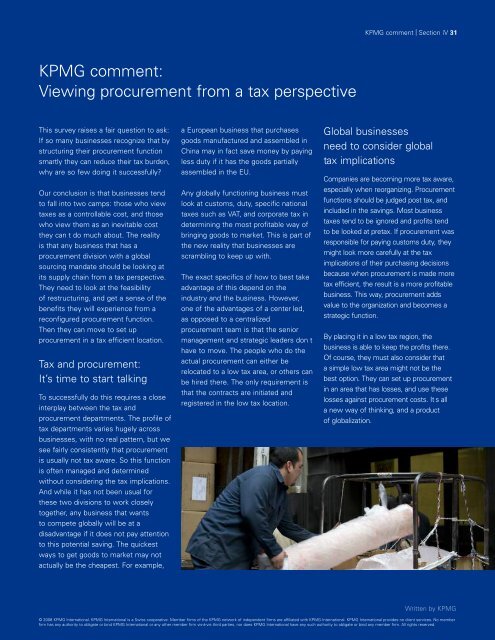Beyond purchasing
You also want an ePaper? Increase the reach of your titles
YUMPU automatically turns print PDFs into web optimized ePapers that Google loves.
KPMG<br />
commentt || Sect ctioion IIV 31<br />
KPMG comment:<br />
Viewing procurement from a tax perspective<br />
This survey raises a fair question to ask:<br />
If so many businesses recognize that by<br />
structuring their procurement function<br />
smartly they can reduce their tax burden,<br />
why are so few doing it successfully?<br />
Our conclusion is that businesses tend<br />
to fall into two camps: those who view<br />
taxes as a controllable cost, and those<br />
who view them as an inevitable cost<br />
they can ’ t do much about. The reality<br />
is that any business that has a<br />
procurement division with a global<br />
sourcing mandate should be looking at<br />
its supply chain from a tax perspective.<br />
They need to look at the feasibility<br />
of restructuring, and get a sense of the<br />
benefits they will experience from a<br />
reconfigured procurement function.<br />
Then they can move to set up<br />
procurement in a tax efficient location.<br />
Tax and procurement:<br />
It’s time to start talking<br />
To successfully do this requires a close<br />
interplay between the tax and<br />
procurement departments. The profile of<br />
tax departments varies hugely across<br />
businesses, with no real pattern, but we<br />
see fairly consistently that procurement<br />
is usually not tax aware. So this function<br />
is often managed and determined<br />
without considering the tax implications.<br />
And while it has not been usual for<br />
these two divisions to work closely<br />
together, any business that wants<br />
to compete globally will be at a<br />
disadvantage if it does not pay attention<br />
to this potential saving. The quickest<br />
ways to get goods to market may not<br />
actually be the cheapest. For example,<br />
a European business that purchases<br />
goods manufactured and assembled in<br />
China may in fact save money by paying<br />
less duty if it has the goods partially<br />
assembled in the EU.<br />
Any globally functioning business must<br />
look at customs, duty, specific national<br />
taxes such as VAT, and corporate tax in<br />
determining the most profitable way of<br />
bringing goods to market. This is part of<br />
the new reality that businesses are<br />
scrambling to keep up with.<br />
The exact specifics of how to best take<br />
advantage of this depend on the<br />
industry and the business. However,<br />
one of the advantages of a center led,<br />
as opposed to a centralized<br />
procurement team is that the senior<br />
management and strategic leaders don ’ t<br />
have to move. The people who do the<br />
actual procurement can either be<br />
relocated to a low tax area, or others can<br />
be hired there. The only requirement is<br />
that the contracts are initiated and<br />
registered in the low tax location.<br />
Global businesses<br />
need to consider global<br />
tax implications<br />
Companies are becoming more tax aware,<br />
especially when reorganizing. Procurement<br />
functions should be judged post tax, and<br />
included in the savings. Most business<br />
taxes tend to be ignored and profits tend<br />
to be looked at pretax. If procurement was<br />
responsible for paying customs duty, they<br />
might look more carefully at the tax<br />
implications of their <strong>purchasing</strong> decisions<br />
because when procurement is made more<br />
tax efficient, the result is a more profitable<br />
business. This way, procurement adds<br />
value to the organization and becomes a<br />
strategic function.<br />
By placing it in a low tax region, the<br />
business is able to keep the profits there.<br />
Of course, they must also consider that<br />
a simple low tax area might not be the<br />
best option. They can set up procurement<br />
in an area that has losses, and use these<br />
losses against procurement costs. It ’ s all<br />
a new way of thinking, and a product<br />
of globalization.<br />
© 2008 KPMG International. KPMG International is a Swiss cooperative. Member firms of the KPMG network of independent firms are affiliated with KPMG International. KPMG International provides no client services. No member<br />
firm has any authority to obligate or bind KPMG International or any other member firm visàvis third parties, nor does KPMG International have any such authority to obligate or bind any member firm. All rights reserved.



